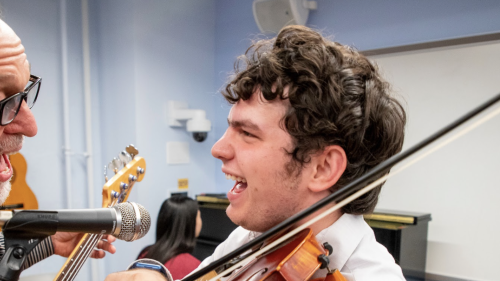

Susan Feiner has been on the faculty of the NYU Music Therapy program for over 30 years. Ms. Feiner has completed level two training in Guided Imagery in Music, completed advanced training in the treatment of children and their parents at the Jewish Board for Family and Children’s Services, and pioneered music psychotherapy with preschool children individually and in small groups. She was part of a group of clinicians that pioneered the use of music therapy in the treatment of trauma post-9/11. She also serves as a consultant to facilities establishing new music therapy programs and internships.
Selected Publications
Lectures on Music Therapy Supervision. Japanese Music Therapy Association Training and Education Committee Lectures, Tokyo, Japan. November 3, 2012.
What Happens in Music Therapy Supervision? JMTA International Symposium for Music Therapy in Tokyo, Tokyo, Japan. November 4, 2012.
"What is Happening to Me? The Potential for Activation of Trauma During Music Therapy Internship." In: Stewart, K. (Ed), 2010. Music Therapy & Trauma: Bridging Theory and Clinical Practice., New York, NY: Satchnote Press.
"What is Happening to Me? The Potential for Activation of Trauma During Music Therapy Internship." 1st International Music Therapy and Trauma Symposium: Bridging Theory and Clinical Practice, Beth Israel Hospital, New York, N.Y. June 8, 2008.
Imagery Through Music. In: Loewy, J. & Frisch A. (Eds). 2002. Caring for the Caregiver: The Use of Music and Music Therapy in Grief and Trauma. Silver Spring, MD.
Caring for th Caregiver Presentation: Imagery and Healing Through Music. Caring for the Caregiver: A 9-week Training in Music, Healing, Grief and Trauma, Post 9/11. Beth Israel Medical Center, New York, NY. April 17, 2002
A Journey Through Internship Supervision: Roles, Dynamics, and Phases of the Supervisory Relationship. In: Forinash, M. (Ed). 2001. Music Therapy Supervision. Gilsum, NH: Barcelona Publishers.
Continuing Edit Course in February, Advanced Topics in Music Therapy Supervision:
Supervision is not only important in the development of professional practice for music therapists, it has the potential to be highly rewarding and inspiring for both supervisor and supervisee. This course will focus on the goals of supervision, the complicated roles of the supervisor, what supervisor and supervisee bring to supervision, phases in the supervisory relationship, and challenges common to both supervisor and supervisee.
